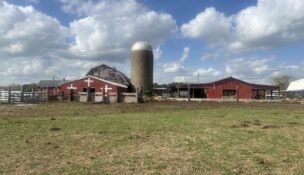Incubator hopes to grow Virginia winemaking
Tim and Ben Jordan are first-generation grape growers on a Shenandoah Valley farm that has been in their family since the 1700s.
Although the brothers “leapt off the ground quite blindly” to pursue their passion, Tim Jordan says — first planting grapes in 2007 — their dream of building a winery on the farm proved “a wall of investment” they couldn’t scale.
Instead, with business partner Patt Eagan, they opened Common Wealth Crush Co., a collaborative winemaking business in Waynesboro‘s Virginia Metalcrafters complex. Over three years, the company plans to invest $1.5 million in ongoing renovations of 17,000 square feet of space, including a tasting room expected to open this spring.
Their vision, Jordan says, is to provide the resources needed for growth “for others like us who were bootstrapping every step of the way.”
The facility provides a range of services for small-scale growers to build their brands, from full production to helping experienced growers who lack the equipment to make their own wine, Eagan says.
The winery began operation in August 2022 with the necessary equipment — from grape presses to fermentation tanks — to produce 11,000 cases of wine from the 2022 harvest. The vintage represents eight distinct brands, in addition to their own house wines.
The goal over the next three years is to process an estimated 450 tons of Virginia-grown grapes with a market value of $1.1 million and create six jobs, likely five full-time and one seasonal.
If it meets those metrics, the company will receive a $25,000 grant from the city of Waynesboro matching an award announced in October 2022 from the state’s Agriculture and Forestry Industries Development Fund.
The city’s contribution will come primarily as reimbursement of local taxes and fees paid by the company during its first three years, says Greg Hitchin, director of Waynesboro’s Office of Economic Development.
The city expects the winery and a brewery already located in the complex to attract tourists from the Shenandoah National Park corridor. The state has more than 300 wineries that draw 2.64 million visitors and contribute $1.7 billion to the economy annually, according to the governor’s office.
Eagan says the winery is focused on but not limited to the Shenandoah Valley.
Virginia’s varied geology produces “really dynamic and interesting wines,” he says. “Wine as a beverage is such as great storyteller of the place it comes from.”
i

















